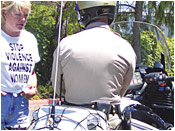POLICE
DOMESTIC VIOLENCE:
Changes the District Attorney Needs to Make
1.
Encourage victims of officer-involved domestic violence to report
directly to the D.A.'s office rather than police. Obviously
victims would feel more comfortable reporting to someone other
than the police, often to the very agency that employs their batterer.
I notice this was done in the Darwin Kennedy case and that your
office assigned it to the Sheriff's Department domestic violence
unit. Is there any reason why this could not be implemented on
a policy level?
2.
All officer-involved domestic violence calls would immediately
trigger a call to the D.A.'s office. A DDA would respond
to the scene and head up the investigation from start to finish.
This is based on Monterey County's new draft policy (attached).
I spoke with Elaine McLees, the DDA there who wrote the policy.
Her
rationale was that this would only amount to only a couple of
cases a year, and thus would not strain the resources of the district
attorney's office. She also has had experiences, similar to ours
with Lubiszewski, showing that it actually would have required
fewer district attorney resources, and a much better possibility
of successful prosecution, if the D.A. had come in at the beginning,
rather than trying to clean up the mess made by the police investigation.
Larry
and I discussed the possible alternative of your office assigning
either SRPD or the SO, rather than one of your investigators,
to conduct the front-line investigation under your direction.
I would be open to discussing this option, within certain parameters.
3.
Track all cases of police-involved domestic violence, and make
that information publicly available. This would include reports
to police or your office, whether they were filed or rejected
by your office, charges filed (misdemeanor/felony), and disposition.
This
has no down-side, and a huge up-side. Clearly if we're going to
address a problem we first have to know its magnitude. At present,
we have no information locally to allow us to do that.
We
do know from national studies, however, that the problem is significant.
In two separate studies, when asked the question, "Have you
been violent with your intimate partner within the past year?"
40% of police officers answered, "Yes." That's a startling
number, and should be a wake-up call to us all that there is a
whole class of women out there who are receiving no law enforcement
protection at all. It's up to us to turn that around. (I'm attaching
further information on the scope of the problem for your information.)
A bare starting place is to begin to quantify the problem.
4.
Assign the victim advocate to all officer-involved DV cases. Miriam
Gaon was assigned to the Lubiszewski case at Mitzie Grabner's
request, but victims should not have to ask for that accommodation.
While
no doubt the domestic violence counselors on your staff perform
a necessary service for victims, they are, in fact, counselors
rather than advocates. Their training and experience is limited,
and their involvement in the Lubiszewski case was, frankly, annoying.
Gaon has many more years experience, she knows the criminal justice
system from top to bottom, and was a valuable resource to both
Mitzie Grabner and Bonnie Garrett through the excruciating trial
process.
The victims of officer-involved DV have a host of problems and
dangers not faced by other domestic violence victims. They need
the victim advocate services of your office.
5.
Continue to fight for victim advocate privilege on these and all
other domestic violence and sexual assault cases. In the long-run,
perhaps most dangerous turn of events in the Lubiszewski case
was Turer's attack on victim advocate privilege. I know your office
stood firm in defending that privilege, at no small expenditure
of time and resources.
I'm
sure you know as well as I do that, having been a successful tactic
in this case, this is the look of things to come on future cases
of violence against women, and that I won't be the only target.
The confidential nature of victims' discussions with victim advocates
and counselors is crucial to their willingness to cooperate in
prosecution. We ask that you continue to vigorously defend that
privilege.
6.
Spearhead changes in the 911 dispatch system. As you know,
in the Lubiszewski case the 911 dispatch records were woefully
incomplete. There's no record of what the callers actually reported
or whether the "verbal dispute" notation was made by
the dispatcher taking the call or the police officer clearing
it. Additionally responding officer Boggeri, who claims he was
not given a specific address where the violence was taking place,
made no contact with the callers to pinpoint the location.
Had
he done so, all would have gone differently in the Lubiszewski
trial. There would have been a 911 tape, a contemporaneous police
report complete with fresh interviews with Mitzie Grabner and
Jeffrey Lubiszewski, and photographs of Grabner's injuries and
of the bedroom where the battery took place. The cell phone Lubiszewski
broke to keep Grabner from calling 911 also would have been taken
into evidence.
I'm
aware you have no direct control over the county's dispatch system.
However, as a powerful member of the Law Enforcement Chiefs' Association,
you are certainly in a position to request the changes necessary
to allow your office to receive the evidence you need for successful
prosecution.
May 2004

|

